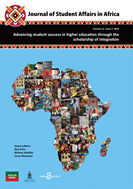Student experiences of attending the first online Southern African Students Psychology Conference at an open distance e-learning university in South Africa
DOI:
https://doi.org/10.24085/jsaa.v12i2.5061Keywords:
Online academic conferences, students, psychology, COVID-19, South Africa, academic socialisation, student experienceAbstract
The devastation and aftermath of the COVID-19 pandemic continue to pervade almost every sphere of human existence, albeit arguably increasingly nuanced. As we move into the post-pandemic world, it is essential to reflect on the lessons learned and forge transformed decolonialised ways of knowledge production in higher education. To ensure the continuation of academic socialisation, academic conference organisers have had to introduce virtual conferencing during the pandemic. In this paper, we discuss the experiences of students that attended the first online Southern African Students Psychology Conference (SASPC) during the pandemic in South Africa within an Open Distance e-Learning context. We use academic socialisation as a theoretical framework to understand student experiences attending the first online SASPC and to discuss the student conference as a site for decolonialisation. From the focus group discussion with student attendees, the historical and current format of the conference unexpectedly emerged as a colonised space of academic socialisation that the students challenged. Opportunities for using the student conference space as a site of decolonisation are explored to contribute to the dearth of scholarly literature aimed at actively incorporating student’s voices in the decolonialisation of academic spaces in the Global South.
Downloads
Published
Issue
Section
License
Copyright (c) 2024 Janice K Moodley-Marie, Bianca Parry, Itumeleng Masisi

This work is licensed under a Creative Commons Attribution-NonCommercial-ShareAlike 4.0 International License.
Authors who publish with this journal agree to the following terms:
Authors retain copyright and grant the journal right of first publication with the work simultaneously licensed under the Creative Commons Attribution Share-alike 4.0 International License that allows others to share the work with an acknowledgement of the work's authorship and initial publication in this journal.
Authors are able to enter into separate, additional contractual arrangements for the non-exclusive distribution of the journal's published version of the work (e.g., post it to an institutional repository or publish it in a book), with an acknowledgement of its initial publication in this journal.
Authors are permitted and encouraged to post their work online (e.g., in institutional repositories or on their website) prior to and during the submission process, as it can lead to productive exchanges, as well as earlier and greater citation of published work (See: The Effect of Open Access).


